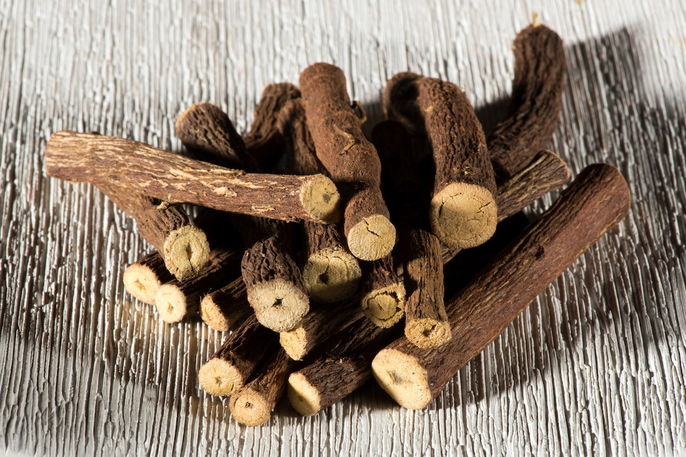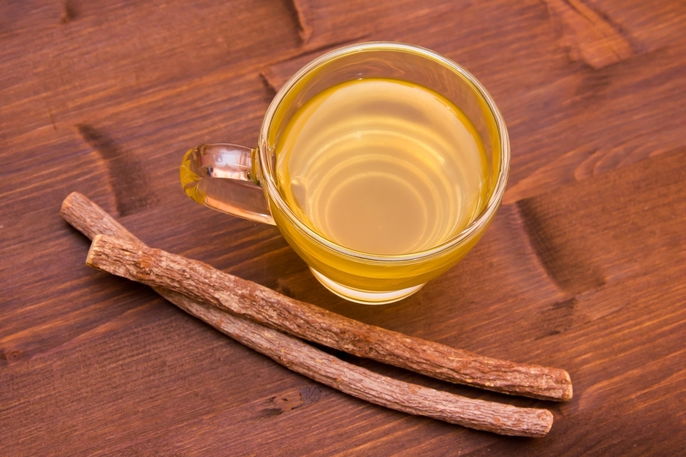Licorice is a medicinal plant that has been used since ancient times to treat various health problems, particularly stomach problems, inflammation and respiratory diseases.
Although it has a number of health benefits, the use of licorice can also cause many side effects in the body, especially when the plant is consumed excessively. This is because licorice is rich in glycyrrhizic acid, a substance that prevents the conversion of cortisol into cortisone. This impairs kidney function and their ability to eliminate excess potassium, which can lead to serious problems like cardiac arrhythmias.
The scientific name for licorice is Glycyrrhiza glabra. This plant can be purchased in health food stores, pharmacies and some farmer's markets. However, it should always be used as directed by a doctor or medicinal plant specialist.

Health benefits
Licorice can provide you with many several health benefits, such as:
1. Eliminating fungi and bacteria
Licorice has substances that seem to be able to eliminate different types of bacteria such as Salmonella, E. coli, Pseudomonas aeruginosa, Staphylococcus aureus and Streptococcus pyogenes. Both its aqueous extract and alcoholic extract can be effective against these microrganisms.
In addition, the use of licorice has shown good action against fungi, any may be effective in eliminating drug-resistant Candida albicans infections. According to a study carried out on HIV patients, licorice tea appears to be an excellent option for treating fungal infections in the mouth.
2. Providing antioxidant action
Several laboratory studies have demonstrated the antioxidant effect of licorice, which seems to be supported by the presence of substances such as glabridin, apigenin and liquiritin.
3. Regulating blood sugar
Studies carried out on rats have shown that the use of licorice seems to be able to regulate blood glucose levels in diabetics. In addition, several reports indicate that the use of licorice seems to reduce the common symptoms of diabetes, such as excessive thirst and frequent urge to urinate.
4. Fighting malaria
Licorice contains a substance known as lycochalcone A, which appears to have a high anti-malarial action and is capable of eliminating the malaria parasite without causing any side effects. For this reason, in China there are 3 different species of licorice that are included in pharmacy reference guidelines as a complementary treatment for malaria.
5. Stimulating the immune system
Laboratory research has shown that licorice is able to increase the production of certain types of lymphocytes and macrophages, which are important immune system cells. In addition, licorice also seems to have some antiviral action, protecting the body against viral infections like influenza.
6. Providing anti-inflammatory action
In some studies, licorice demonstrated strong anti-inflammatory action, showing an even stronger efficacy than hydrocortisone, a type of corticosteroid widely used to treat inflammation such as arthritis and skin problems.
Unlike medical anti-inflammatory drugs, the use of licorice does not seem to affect the stomach lining.
7. Protecting the stomach and liver
Carbenoxolone is a synthetic substance widely used to treat gastric ulcers and was originally created with a structure similar to a substance found in licorice root that helps protect the stomach.
In addition, glycyrrhizic acid has also been shown to have a hepatoprotective action. It can reduce inflammation in liver cells and potentially help to prevent the appearance of cancer in this organ.
8. Promoting phlegm elimination
Although the mechanism of action is not fully known, several studies have shown that the use of licorice helps to reduce irritation in the throat area, as well as promote the elimination of phlegm.
For this reason, this plant has been widely used since ancient times to treat respiratory problems, especially for wet coughs in infections like bronchitis.

How to take
The most commonly used part of licorice is its root. This is where its active substances are extracted. One of the most popular forms of use is tea, which can be made as follows:
1. Licorice tea
Ingredients
- 5 g of licorice root
- 500 ml of water
Directions
Place 5 g of licorice root in 500 ml of water and boil for 10 to 15 minutes. Then leave to cool, strain and drink up to 2 cups a day.
2. Licorice capsules
The best way to use licorice for medicinal purposes is to use it in capsule form, as directed by a medicinal plant specialist who will prescribe the best daily dosage according to the problem to be treated. In general, the dose used is 150 to 300 mg.
Because licorice has some side effects, it is generally recommended not to exceed the daily dose of 500 mg of licorice.
Possible side effects
Licorice is generally considered to be a safe plant to consume. However, if it is consumed in excess, the glycyrrhizinic acid in its composition can cause some side effects like increasing cortisol levels, reducing potassium levels, increasing blood pressure, muscle weakness and cardiac arrhythmias.
Licorice can also decrease testosterone levels if taken in doses over 500 mg.
Although rare, it is possible for licorice poisoning to occur, especially when the plant is consumed in high doses and for a long time. Licorice poisoning can result in kidney failure, heart problems and fluid accumulation in the lungs.
There are now some licorice supplements on the market that are free of glycyrrhizinic acid, but this is also one of the most important substances in licorice and is responsible for many of its therapeutic effects.
Contraindications for use
Because it is associated with many side effects, licorice should be used as prescribed by a doctor or medicinal plant specialist.
Its use is completely contraindicated in people with high blood pressure, heart problems, kidney disease and low levels of potassium in the blood. Licorice should also be avoided during pregnancy and breastfeeding.
Lastly, licorice can also interact with some medications, particularly high blood pressure medications, anticoagulants, diuretics, contraceptives and anti-inflammatory drugs.






























